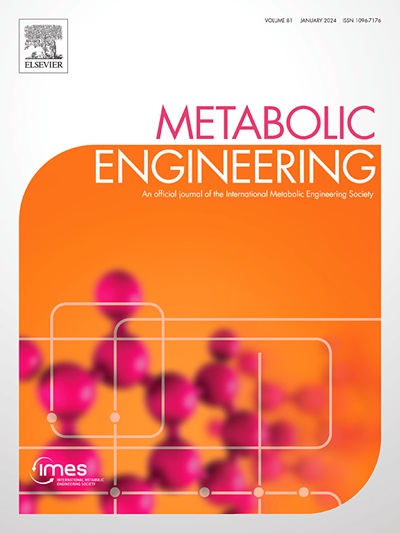Direct mRNA-to-sgRNA conversion generates design-free ultra-dense CRISPRi libraries for systematic phenotypic screening
IF 6.8
1区 生物学
Q1 BIOTECHNOLOGY & APPLIED MICROBIOLOGY
引用次数: 0
Abstract
CRISPR interference (CRISPRi) is a versatile tool for high-throughput phenotypic screening. However, rational design and synthesis of the single-guide RNA (sgRNA) library required for each genome-wide CRISPRi application is time-consuming, expensive, and unfeasible if the target organisms lack comprehensive sequencing and characterization. We developed an ultra-dense random sgRNA library generation method applicable to any organism, including those that are not well-characterized. Our method converts transcriptome-wide mRNA into 20 nt of sgRNA spacer sequences through enzymatic reactions. The generated sgRNA library selectively binds to the non-template strand of the coding sequence, leading to more efficient repression compared to binding the template strand. We then generated a genome-scale library for Escherichia coli by applying this method and identified essential and auxotrophic genes through phenotypic screening. Furthermore, we tuned the production levels of lycopene and violacein and identified new repression targets for violacein production. Our results demonstrated that a genome-scale sgRNA library can be generated without rational design and can be utilized simultaneously in a range of phenotypic screenings.
求助全文
约1分钟内获得全文
求助全文
来源期刊

Metabolic engineering
工程技术-生物工程与应用微生物
CiteScore
15.60
自引率
6.00%
发文量
140
审稿时长
44 days
期刊介绍:
Metabolic Engineering (MBE) is a journal that focuses on publishing original research papers on the directed modulation of metabolic pathways for metabolite overproduction or the enhancement of cellular properties. It welcomes papers that describe the engineering of native pathways and the synthesis of heterologous pathways to convert microorganisms into microbial cell factories. The journal covers experimental, computational, and modeling approaches for understanding metabolic pathways and manipulating them through genetic, media, or environmental means. Effective exploration of metabolic pathways necessitates the use of molecular biology and biochemistry methods, as well as engineering techniques for modeling and data analysis. MBE serves as a platform for interdisciplinary research in fields such as biochemistry, molecular biology, applied microbiology, cellular physiology, cellular nutrition in health and disease, and biochemical engineering. The journal publishes various types of papers, including original research papers and review papers. It is indexed and abstracted in databases such as Scopus, Embase, EMBiology, Current Contents - Life Sciences and Clinical Medicine, Science Citation Index, PubMed/Medline, CAS and Biotechnology Citation Index.
 求助内容:
求助内容: 应助结果提醒方式:
应助结果提醒方式:


